Table of Contents
Chapter 2
"An Unparalleled Opportunity for Service": The American YMCA Mobilizes
1 A peaceful and prosperous European-dominated world was shattered during the summer of 1914 when Austria-Hungary declared war on Serbia on July 28. The age of Pax Britannica ended suddenly as the nineteenth-century world collapsed into the cataclysm of a world war. Great Britain entered the war on August 4, and Canada followed the Crown. The International Committee of the YMCA found itself in the vexing position of representing both a belligerent dominion and a neutral republic. The existence of the Canadian National Council, founded two years earlier, eased this delicate diplomatic situation, and the International Committee embraced the Wilson Administration's Neutrality Proclamation in August 1914. The American YMCA could now serve as a neutral welfare organization, tasked with alleviating the suffering of war victims in Europe.1
2
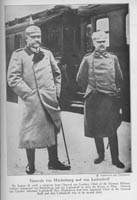 The grand European alliance systems set mobilization plans into motion that plunged the continent into war in July of 1914.
Following the von Schlieffen Plan, the German High Command concentrated their forces on the Western Front and fought a
delaying action against the Russians. Five German armies crashed through Belgium and Luxembourg, sending the French and
Belgian armies and the British Expeditionary Force reeling towards Paris. As a result of this lightning offensive, the
Germans captured huge numbers of French, Belgian, and British troops. In the East, the Russians surprised the German General
Staff by mobilizing faster than the Germans anticipated, and invaded East Prussia with two massive armies. Only the diversion
of troops scheduled for the Western Front halted the Russian offensive. General Paul von Hindenburg and his adjutant,
General Erich von Ludendorff, won a stunning victory over the Russians at the Battle of Tannenburg in August 1914. This
ended the Russian threat to East Prussia and resulted in the destruction of the Russian Second Army and the capture of
ninety-two thousand Russian troops.
The grand European alliance systems set mobilization plans into motion that plunged the continent into war in July of 1914.
Following the von Schlieffen Plan, the German High Command concentrated their forces on the Western Front and fought a
delaying action against the Russians. Five German armies crashed through Belgium and Luxembourg, sending the French and
Belgian armies and the British Expeditionary Force reeling towards Paris. As a result of this lightning offensive, the
Germans captured huge numbers of French, Belgian, and British troops. In the East, the Russians surprised the German General
Staff by mobilizing faster than the Germans anticipated, and invaded East Prussia with two massive armies. Only the diversion
of troops scheduled for the Western Front halted the Russian offensive. General Paul von Hindenburg and his adjutant,
General Erich von Ludendorff, won a stunning victory over the Russians at the Battle of Tannenburg in August 1914. This
ended the Russian threat to East Prussia and resulted in the destruction of the Russian Second Army and the capture of
ninety-two thousand Russian troops.
3
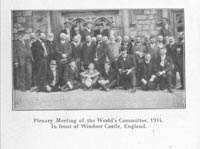 The war in Europe was a catastrophe for Western Christianity. The American, British, and German YMCAs had worked
closely together under the umbrella of the World's Alliance of YMCAs to evangelize the world before the war, but
now the Germans and English were locked in a death struggle. The World's Committee met in London in July 1914 for
its plenary meeting to discuss the World's Alliance's plans for the future. They decided to focus on the theme "For
Conquest" as the watchword for their program. "Then came the cataclysm which convulsed the world, overthrew many of
our plans, and threatened to destroy international relations for a long time," one attendee wrote. The outbreak of
the war shattered the cohesiveness of the World's Alliance, and the membership would not hold another plenary meeting
for six years.2
The war in Europe was a catastrophe for Western Christianity. The American, British, and German YMCAs had worked
closely together under the umbrella of the World's Alliance of YMCAs to evangelize the world before the war, but
now the Germans and English were locked in a death struggle. The World's Committee met in London in July 1914 for
its plenary meeting to discuss the World's Alliance's plans for the future. They decided to focus on the theme "For
Conquest" as the watchword for their program. "Then came the cataclysm which convulsed the world, overthrew many of
our plans, and threatened to destroy international relations for a long time," one attendee wrote. The outbreak of
the war shattered the cohesiveness of the World's Alliance, and the membership would not hold another plenary meeting
for six years.2
4
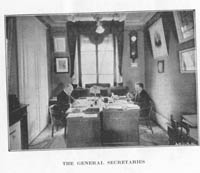 The members of the World's Alliance Executive Committee met on 4 August 1914 in London and scheduled two special
sessions on August 8 and 27. This marked the beginning of the War Work of the World's Committee, although the
Executive Committee was effectively reduced in membership to the "Geneva Executive." The World's Alliance faced
major constraints that limited the organization's effectiveness in dealing with the global crisis. Military censors
in belligerent nations hampered communications between Geneva and other national Associations. Transportation was
equally difficult, especially after Italy entered the war, because Switzerland remained the only neutral country in
Central Europe. Communication and transportation problems isolated the World's Committee, limiting its ability to
function. The outbreak of war also reduced membership in the Executive Committee. The World's Committee was led by
two General Secretaries, Christian Phildius and Emmanuel Sautter. At the August 8 meeting, Sautter requested a leave
of absence for an indefinite period so he could return to France to offer his services to his country. The French
mobilization had undermined the French National YMCA's ability to provide services to French troops, and Sautter planned
to organize work on behalf of French soldiers. Most importantly, from the World's Alliance perspective, the national
membership of the organization was split between belligerents and neutrals, which reduced the resources available to
the World's Committee to conduct welfare operations.3
The members of the World's Alliance Executive Committee met on 4 August 1914 in London and scheduled two special
sessions on August 8 and 27. This marked the beginning of the War Work of the World's Committee, although the
Executive Committee was effectively reduced in membership to the "Geneva Executive." The World's Alliance faced
major constraints that limited the organization's effectiveness in dealing with the global crisis. Military censors
in belligerent nations hampered communications between Geneva and other national Associations. Transportation was
equally difficult, especially after Italy entered the war, because Switzerland remained the only neutral country in
Central Europe. Communication and transportation problems isolated the World's Committee, limiting its ability to
function. The outbreak of war also reduced membership in the Executive Committee. The World's Committee was led by
two General Secretaries, Christian Phildius and Emmanuel Sautter. At the August 8 meeting, Sautter requested a leave
of absence for an indefinite period so he could return to France to offer his services to his country. The French
mobilization had undermined the French National YMCA's ability to provide services to French troops, and Sautter planned
to organize work on behalf of French soldiers. Most importantly, from the World's Alliance perspective, the national
membership of the organization was split between belligerents and neutrals, which reduced the resources available to
the World's Committee to conduct welfare operations.3
5
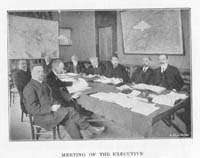 To address these problems, Phildius submitted a relief plan to the Executive Committee on 8 August 1914. He called on
the World's Alliance to develop services for soldiers at the front, wounded troops, and prisoners of war from all
nations. On August 12, the Executive Committee sent a circular letter outlining its war relief plans to the national
YMCA committees of all the member nations of the World's Alliance, including belligerent and neutral countries. The
World's Committee sent a telegram to the International Committee of YMCAs of North America in New York on August 28,
asking the American Association for financial support and qualified secretaries to begin war relief operations. The
resources of the World's Alliance were stretched thinly, especially with the leading Protestant European powers, Britain
and Germany, fighting each other in total war. Since most of the World's Alliance's membership were concentrating on national
war efforts, the World's Committee acknowledged its limited resource base and looked to the American YMCA for funding and
manpower to meet this "unparalleled opportunity [in] Association history." Under the World's Committee scheme, the English
and German national associations would look after the needs of their own troops. However, the Executive Committee needed
assistance in providing social welfare programs for Catholic soldiers in France and Austria-Hungary. The committee sent
outlines of their plans to Richard Morse, the aged General Secretary of the North American YMCA, on September 3 and to
John R. Mott on September 7.4
To address these problems, Phildius submitted a relief plan to the Executive Committee on 8 August 1914. He called on
the World's Alliance to develop services for soldiers at the front, wounded troops, and prisoners of war from all
nations. On August 12, the Executive Committee sent a circular letter outlining its war relief plans to the national
YMCA committees of all the member nations of the World's Alliance, including belligerent and neutral countries. The
World's Committee sent a telegram to the International Committee of YMCAs of North America in New York on August 28,
asking the American Association for financial support and qualified secretaries to begin war relief operations. The
resources of the World's Alliance were stretched thinly, especially with the leading Protestant European powers, Britain
and Germany, fighting each other in total war. Since most of the World's Alliance's membership were concentrating on national
war efforts, the World's Committee acknowledged its limited resource base and looked to the American YMCA for funding and
manpower to meet this "unparalleled opportunity [in] Association history." Under the World's Committee scheme, the English
and German national associations would look after the needs of their own troops. However, the Executive Committee needed
assistance in providing social welfare programs for Catholic soldiers in France and Austria-Hungary. The committee sent
outlines of their plans to Richard Morse, the aged General Secretary of the North American YMCA, on September 3 and to
John R. Mott on September 7.4
6
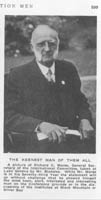 On behalf of the International Committee, Morse sent a favorable reply to the World's Alliance request on September 25.
Four days later, he reported that Mott was on his way to Europe to investigate the situation. The American YMCA mobilized
its resources for overseas service as the war spread across Europe in August 1914. The International Committee had
considerable experience providing assistance to soldiers and POWs during the American Civil War and Spanish-American
War. In addition, individual secretaries had gained first-hand knowledge of war prisoner and soldier relief during the
Boer War, the Russo-Japanese War, and the Balkan Wars. The paramount challenge facing the organization was gaining
access to those in greatest need, especially in the face of the deep suspicions created by this global war. In previous
conflicts, the American Association's offer of social assistance was welcomed by belligerent governments, but the number
of nations embroiled in World War I and the intensity of total war created a hostile international environment. The
American YMCA leadership discovered that they had to develop new "diplomatic skills" to deal successfully with suspicious
belligerent governments.5
On behalf of the International Committee, Morse sent a favorable reply to the World's Alliance request on September 25.
Four days later, he reported that Mott was on his way to Europe to investigate the situation. The American YMCA mobilized
its resources for overseas service as the war spread across Europe in August 1914. The International Committee had
considerable experience providing assistance to soldiers and POWs during the American Civil War and Spanish-American
War. In addition, individual secretaries had gained first-hand knowledge of war prisoner and soldier relief during the
Boer War, the Russo-Japanese War, and the Balkan Wars. The paramount challenge facing the organization was gaining
access to those in greatest need, especially in the face of the deep suspicions created by this global war. In previous
conflicts, the American Association's offer of social assistance was welcomed by belligerent governments, but the number
of nations embroiled in World War I and the intensity of total war created a hostile international environment. The
American YMCA leadership discovered that they had to develop new "diplomatic skills" to deal successfully with suspicious
belligerent governments.5
7
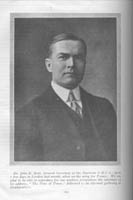 In late September 1914, Mott sailed to Europe to assess the situation and determine how the American YMCA could best
meet the needs of people in distress. Mott represented three major interests during his visit: as chairman of the
Edinburgh Missionary Conference Continuation Committee; as the General Secretary of the World's Student Christian
Federation (WSCF); and as a member (and within a few months, General Secretary) of the International Committee of the
YMCAs of North America. Originally scheduled to sail to the Netherlands, the Royal Navy intercepted his steamship, the S.S. Niew Amsterdam, and ordered the ship to proceed to Plymouth for inspection on suspicion of carrying conditional
contraband. Through his influence, Mott disembarked in Britain and proceeded to Holland to meet with Dr. Herman Rutgers,
the General Secretary of the Dutch Student Christian Movement. Mott and Rutgers continued to Berlin where they met
Karl Fries (chairman of the WSCF), Phildius, and Pierre de Benoit (of the Swiss Student Christian Movement) on October
18.
In late September 1914, Mott sailed to Europe to assess the situation and determine how the American YMCA could best
meet the needs of people in distress. Mott represented three major interests during his visit: as chairman of the
Edinburgh Missionary Conference Continuation Committee; as the General Secretary of the World's Student Christian
Federation (WSCF); and as a member (and within a few months, General Secretary) of the International Committee of the
YMCAs of North America. Originally scheduled to sail to the Netherlands, the Royal Navy intercepted his steamship, the S.S. Niew Amsterdam, and ordered the ship to proceed to Plymouth for inspection on suspicion of carrying conditional
contraband. Through his influence, Mott disembarked in Britain and proceeded to Holland to meet with Dr. Herman Rutgers,
the General Secretary of the Dutch Student Christian Movement. Mott and Rutgers continued to Berlin where they met
Karl Fries (chairman of the WSCF), Phildius, and Pierre de Benoit (of the Swiss Student Christian Movement) on October
18.
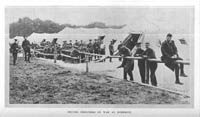 The YMCA leaders conferred with German National Association officials to assess the impact of the war on the movement.
They visited overcrowded hospitals and observed long lines of family members at the Ministry of War seeking information
about the dead and wounded. News arrived daily at the Student Movement headquarters about friends and members who had
been killed or wounded. The Association leaders also visited the military prison camp at Döberitz, where the Germans
incarcerated three thousand British POWs. During a special religious service at the facility, Mott delivered a sermon. All of the
YMCA officials were moved by the experience. Mott became dedicated to the goal of raising millions of dollars and recruiting
scores of secretaries to alleviate the sad lot of war prisoners. He gave Phildius £ 500 to employ three or four secretaries
for War Prisoners' Aid (WPA) and War Work for prisoners and soldiers in Austria-Hungary and promised a similar sum for
identical work in France. This sum would support relief operations for one year and signified Mott's acceptance of the
World's Committee relief plan. The American secretary also provided Phildius with a letter of introduction to Frederic
Courtland Penfield, the U.S. Ambassador in Vienna, so that Phildius could begin negotiations to gain access to Allied
prisoners in the Habsburg Empire. This marked the beginning of the WPA work that Mott would supervise for the World's
Alliance, and the Americans became the chief financial supporters of the service.6
The YMCA leaders conferred with German National Association officials to assess the impact of the war on the movement.
They visited overcrowded hospitals and observed long lines of family members at the Ministry of War seeking information
about the dead and wounded. News arrived daily at the Student Movement headquarters about friends and members who had
been killed or wounded. The Association leaders also visited the military prison camp at Döberitz, where the Germans
incarcerated three thousand British POWs. During a special religious service at the facility, Mott delivered a sermon. All of the
YMCA officials were moved by the experience. Mott became dedicated to the goal of raising millions of dollars and recruiting
scores of secretaries to alleviate the sad lot of war prisoners. He gave Phildius £ 500 to employ three or four secretaries
for War Prisoners' Aid (WPA) and War Work for prisoners and soldiers in Austria-Hungary and promised a similar sum for
identical work in France. This sum would support relief operations for one year and signified Mott's acceptance of the
World's Committee relief plan. The American secretary also provided Phildius with a letter of introduction to Frederic
Courtland Penfield, the U.S. Ambassador in Vienna, so that Phildius could begin negotiations to gain access to Allied
prisoners in the Habsburg Empire. This marked the beginning of the WPA work that Mott would supervise for the World's
Alliance, and the Americans became the chief financial supporters of the service.6
8
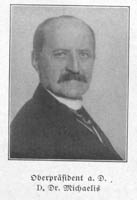 Mott also met with other important groups in Berlin. He conferred with leaders of the German Christian Student
Movement (the Deutsche Christliche Studenten Vereinigung, or DCSV), including its new president, Dr. Georg
Michaelis (who became the Imperial Chancellor and Prussian Minister-President in 1917); Dr. Gerhard Niedermeyer
(General Secretary); Pastor Le Seur; Pastor Kieser; Franz Spemann; Friedrich Wilhelm Siegmund-Schultze; and Pastor
Paul Humburg. In a private conversation, Michaelis, the DCSV president, gave Mott an impassioned defense of Germany's
attitude towards England and Russia, providing Mott with a better understanding of the feelings of the German people.
During these discussions, the Association leaders learned of the war's devastating effect on the movement in Germany.
To meet national needs, the Germans turned to the German Student Service, "the natural product of Christian concern for
the needs of body, mind, and spirit, first of German students in the field, next of German soldiers, then of prisoners
of war."7 With the cooperation of Michaelis, who then served
as Prussian Under-Secretary of Finance, and Siegmund-Schultze, and his experience with student centers, the German
Student Service became an immense operation, with a budget exceeding thirty million Marks by 1918. In November 1914, Mott
completed his tour of France and Britain, meeting with Association and government officials in both countries. Mott
realized that the American YMCA was in a unique position to offer relief assistance to war-torn Europe. He assured
his European colleagues that they could count on American assistance and returned to the United States to report to
the International Committee. The Americans would then formulate a plan to extend welfare assistance to the unfortunate
masses of Europe.8
Mott also met with other important groups in Berlin. He conferred with leaders of the German Christian Student
Movement (the Deutsche Christliche Studenten Vereinigung, or DCSV), including its new president, Dr. Georg
Michaelis (who became the Imperial Chancellor and Prussian Minister-President in 1917); Dr. Gerhard Niedermeyer
(General Secretary); Pastor Le Seur; Pastor Kieser; Franz Spemann; Friedrich Wilhelm Siegmund-Schultze; and Pastor
Paul Humburg. In a private conversation, Michaelis, the DCSV president, gave Mott an impassioned defense of Germany's
attitude towards England and Russia, providing Mott with a better understanding of the feelings of the German people.
During these discussions, the Association leaders learned of the war's devastating effect on the movement in Germany.
To meet national needs, the Germans turned to the German Student Service, "the natural product of Christian concern for
the needs of body, mind, and spirit, first of German students in the field, next of German soldiers, then of prisoners
of war."7 With the cooperation of Michaelis, who then served
as Prussian Under-Secretary of Finance, and Siegmund-Schultze, and his experience with student centers, the German
Student Service became an immense operation, with a budget exceeding thirty million Marks by 1918. In November 1914, Mott
completed his tour of France and Britain, meeting with Association and government officials in both countries. Mott
realized that the American YMCA was in a unique position to offer relief assistance to war-torn Europe. He assured
his European colleagues that they could count on American assistance and returned to the United States to report to
the International Committee. The Americans would then formulate a plan to extend welfare assistance to the unfortunate
masses of Europe.8
9 At the International Committee meeting in New York on 10 December 1914, Mott described the devastation the war had brought to Europe. Tremendous numbers of people needed Association assistance in all the belligerent nations, including students called to their nation's colors, troops facing death in the trenches, wounded and sick men lying in hospitals, and refugees fleeing from their homes and certain destruction. Although Mott acknowledged the great disaster this war represented to Christian civilization, he maintained an optimistic view that became the hallmark of YMCA diplomacy and service during the war. The International Committee agreed that the war represented a tremendous and unique opportunity to minister to spiritual needs and provide social services for millions of people around the world. The major issue facing the American YMCA was how to extend assistance to the most needy groups in Europe without violating U.S. neutrality.9
10
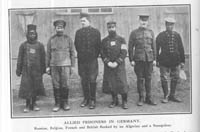 American YMCA assistance to foreign troops fighting on the front lines, stationed in the rear areas, or even
recuperating in military hospitals was a thorny issue. The members of the World's Alliance in Geneva recommended
in August 1914 that the national alliances focus their welfare activities on the members of their respective armed
forces. In addition, the American YMCA was bound to uphold the foreign policy of the Wilson Administration. In August,
President Woodrow Wilson issued the Neutrality Proclamation, calling on American citizens to be neutral in thought, as
well as deed, with respect to the war in Europe. As a result, American YMCA assistance to foreign soldiers was a
duplication of the activities of Associations from belligerent nations, and a possible violation of U.S. neutrality.
In his presentation, Mott reported that the General Secretaries of the English National Council and the German National
YMCA urged the Americans to initiate social work for their nationals interned in enemy prison camps. In response, the
International Committee followed Mott's recommendation that they focus American relief assistance on POWs held by the
belligerent nations. These war prisoners were far from home and beyond the reach of national social welfare organizations,
incarcerated in a hostile land. Under international law, their status had changed from combatants to dependents of the
belligerent state.10
American YMCA assistance to foreign troops fighting on the front lines, stationed in the rear areas, or even
recuperating in military hospitals was a thorny issue. The members of the World's Alliance in Geneva recommended
in August 1914 that the national alliances focus their welfare activities on the members of their respective armed
forces. In addition, the American YMCA was bound to uphold the foreign policy of the Wilson Administration. In August,
President Woodrow Wilson issued the Neutrality Proclamation, calling on American citizens to be neutral in thought, as
well as deed, with respect to the war in Europe. As a result, American YMCA assistance to foreign soldiers was a
duplication of the activities of Associations from belligerent nations, and a possible violation of U.S. neutrality.
In his presentation, Mott reported that the General Secretaries of the English National Council and the German National
YMCA urged the Americans to initiate social work for their nationals interned in enemy prison camps. In response, the
International Committee followed Mott's recommendation that they focus American relief assistance on POWs held by the
belligerent nations. These war prisoners were far from home and beyond the reach of national social welfare organizations,
incarcerated in a hostile land. Under international law, their status had changed from combatants to dependents of the
belligerent state.10
11
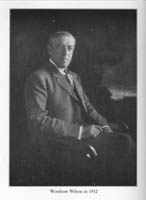 Mott also visited the White House early in January 1915 to report to the president on the results of his European tour.
Although Mott and Wilson may have crossed paths in 1886 at Cornell University (Mott was president of the Student
Association and Wilson was a visiting lecturer from Bryn Mawr College), they formally met at Wesleyan University in
Middletown, Connecticut in October 1889. Mott was touring Student Associations across the country in support of the
Student Volunteer Movement, while Wilson was a professor at Wesleyan. The New England SVM Conference at this university
in January 1890 fostered the growing relationship between these two men. Wilson became active in campus and regional
Associations, an interest he maintained through his tenure at Princeton. The college professor shared Mott's Protestant
view of the world and his ideas on the importance of a Christian education. As Mott developed the North American Student
Christian Movement at the beginning of the twentieth century, he received the praise and admiration of the new president
of Princeton University, Woodrow Wilson. Higher education was about to undertake tremendous expansion across the U.S.,
and the Protestant churches were growing even faster. The Student Christian Movement was a key element in this expansion.
By 1902, Mott presided over 648 Student Associations in colleges, universities, and professional schools across America.
Wilson recognized the importance of Mott's work, and the two became friends. Both Wilson and Mott participated in the
establishment of the Federal Council of the Churches of Christ in 1905, and Wilson reviewed Mott's manuscript on The
Future Leadership of the Church in 1908, a book based on hundreds of interviews of church leaders around the world.
To publicize this work, Wilson agreed to write one of seven pamphlets (the others were written by recognized denominational
leaders) that were later collected and published as The Claims and Opportunities of the Christian Ministry in 1909.
Mott wrote the foreword to the collection.11
Mott also visited the White House early in January 1915 to report to the president on the results of his European tour.
Although Mott and Wilson may have crossed paths in 1886 at Cornell University (Mott was president of the Student
Association and Wilson was a visiting lecturer from Bryn Mawr College), they formally met at Wesleyan University in
Middletown, Connecticut in October 1889. Mott was touring Student Associations across the country in support of the
Student Volunteer Movement, while Wilson was a professor at Wesleyan. The New England SVM Conference at this university
in January 1890 fostered the growing relationship between these two men. Wilson became active in campus and regional
Associations, an interest he maintained through his tenure at Princeton. The college professor shared Mott's Protestant
view of the world and his ideas on the importance of a Christian education. As Mott developed the North American Student
Christian Movement at the beginning of the twentieth century, he received the praise and admiration of the new president
of Princeton University, Woodrow Wilson. Higher education was about to undertake tremendous expansion across the U.S.,
and the Protestant churches were growing even faster. The Student Christian Movement was a key element in this expansion.
By 1902, Mott presided over 648 Student Associations in colleges, universities, and professional schools across America.
Wilson recognized the importance of Mott's work, and the two became friends. Both Wilson and Mott participated in the
establishment of the Federal Council of the Churches of Christ in 1905, and Wilson reviewed Mott's manuscript on The
Future Leadership of the Church in 1908, a book based on hundreds of interviews of church leaders around the world.
To publicize this work, Wilson agreed to write one of seven pamphlets (the others were written by recognized denominational
leaders) that were later collected and published as The Claims and Opportunities of the Christian Ministry in 1909.
Mott wrote the foreword to the collection.11
12 The close ties between the two leaders were made even more apparent when Wilson offered Mott an honorary degree from Princeton in 1910. Both were disappointed when Mott postponed the ceremony to travel to Edinburgh for the World Missionary Conference. During that year, Wilson was elected Governor of New Jersey, and Mott was nominated for the Princeton presidency. Mott declined consideration, and Wilson responded that "Mr. Mott can't afford to take the presidency of a great university; Mr. Mott occupies a certain spiritual presidency in the spiritual university of the world."12 The future role of the American missionary movement as a world force was reflected in the citation that accompanied the Princeton LL.D. that Mott received in 1911:
John R. Mott, honored by academic and religious bodies for his services in planning and extending the active Christian work of university students; devisor of national and international agencies for this work, particularly the World's Student Christian Federation; presiding leader in the World's Missionary Movement in Edinburgh in 1910; a traveler over four continents in search of room for work; a man of buoyant energy, deep consecration, astonishing success; a new Crusader bent on the Christian conquest of the world.13
13
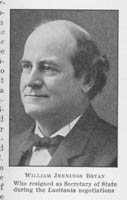 When Wilson was elected President of the United States in November 1912, Mott was in Ceylon on another world mission.
The refusal of the Taft Administration to recognize the new Republic of China was a major problem in the Far East. The
missionary community pressured Wilson to recognize the new government, and after Mott arrived in Peking in February 1913,
he cabled Wilson a seven-point brief urging the new administration to recognize the Chinese republic as quickly as
possible. But Wilson also had another issue to consider: if he recognized the new Chinese government, who would
he send to serve as the U.S. ambassador? After discussing his selection with his Secretary of State-elect, William
Jennings Bryan, Wilson cabled Mott on February 24 asking the missionary if he would serve as his ambassador to China.
The future president was willing to accept any arrangements that allowed Mott to fulfill his current obligations.
Despite this offer, Mott declined. Even after his inauguration, Wilson continued to pursue Mott's acceptance. Wilson
persuaded other YMCA associates and friends to urge Mott to reconsider because "the interests of China and the Christian
world are so intricately involved."14 Facing these pressures,
Mott agreed to reconsider the offer. At the time of this important decision, Mott's wife joined him in China, and they
discussed the implications of this post for Mott's work. On March 31, Mott cabled Wilson: "Must decline truly great
opportunity. This done with profound appreciation present situation and full sympathy with policy. Could not fulfill
serious obligations already assumed and do justice to new position."15
When Wilson was elected President of the United States in November 1912, Mott was in Ceylon on another world mission.
The refusal of the Taft Administration to recognize the new Republic of China was a major problem in the Far East. The
missionary community pressured Wilson to recognize the new government, and after Mott arrived in Peking in February 1913,
he cabled Wilson a seven-point brief urging the new administration to recognize the Chinese republic as quickly as
possible. But Wilson also had another issue to consider: if he recognized the new Chinese government, who would
he send to serve as the U.S. ambassador? After discussing his selection with his Secretary of State-elect, William
Jennings Bryan, Wilson cabled Mott on February 24 asking the missionary if he would serve as his ambassador to China.
The future president was willing to accept any arrangements that allowed Mott to fulfill his current obligations.
Despite this offer, Mott declined. Even after his inauguration, Wilson continued to pursue Mott's acceptance. Wilson
persuaded other YMCA associates and friends to urge Mott to reconsider because "the interests of China and the Christian
world are so intricately involved."14 Facing these pressures,
Mott agreed to reconsider the offer. At the time of this important decision, Mott's wife joined him in China, and they
discussed the implications of this post for Mott's work. On March 31, Mott cabled Wilson: "Must decline truly great
opportunity. This done with profound appreciation present situation and full sympathy with policy. Could not fulfill
serious obligations already assumed and do justice to new position."15
14 When Mott and Wilson met in the White House in January 1915, the world situation had changed tremendously. Mott again described the terrible conditions he witnessed in Europe and the catastrophe the war represented for Christian civilization. The two leaders discussed the administration's neutral policy and how the American YMCA could provide social welfare assistance overseas while avoiding any violations of U.S. neutrality. Wilson agreed that the International Committee's plan to extend relief to war prisoners in both Allied and Central Power countries would address a desperate need and complement the administration's foreign policy. The American YMCA now had President Wilson's support for an ambitious relief program in Europe.16
Notes:
Note 1: Kenneth Scott Latourette, World Service: A History of the Foreign Work and World Service of the Young Men's Christian Associations of the United States and Canada (New York: Association Press, 1957), 76-77.back
Note 2: World's Committee of Young Men's Christian Associations, "World's Committee of Young Men's Christian Associations Plenary Meeting of 1920 at Geneva: Report of the Executive for the Period July 1914 to June 1920," The Sphere 2:3 (1921): 193. back
Note 3: World's Committee of YMCAs, The Sphere (1921): 193-94. back
Note 4: World's Committee of YMCAs, The Sphere (1921): 193-94; "Memorandum for Mr. Henroid," (circa June 1918), 1. World's Alliance Box X391: "War Work YMCA, 1914-1918: World's Committee, Geneva." Folder: "War Prisoners' Aid Y.M.C.A.—Lists of Secretaries/Instructions for Secretaries, 1914-1918." World's Alliance of YMCAs Archives, Geneva, Switzerland; World's Committee of the International YMCA, 12 August 1914, Geneva, Switzerland. Armed Services Records Box AS-20, Folder i, Kautz Family YMCA Archives, University of Minnesota Libraries, Minneapolis, MN; and Paul Des Gouttes to Richard C. Morse, 3 September 1914, Geneva, Switzerland. Christian Phildius to Richard C. Morse, 7 September 1914, Geneva, Switzerland. John R. Mott Papers, Box 70, Folder 1279, Yale School of Divinity, New Haven, CT. back
Note 5: John R. Mott to Christian Phildius, 25 September 1914, New York. John R. Mott Papers, Box 70, Folder 1279, Yale School of Divinity, New Haven, CT. back
Note 6: International Committee Monthly Meeting Minutes, 1909-1916, "Summary of Minutes of Regular Monthly Meetings of the International Committee of the Young Men's Christian Associations," 8 October 1914, 12 November 1914, and 10 December 1914, New York. Kautz Family YMCA Archives, University of Minnesota Libraries, Minneapolis, MN; "Memorandum to Mr. Henroid," (circa June 1918), 1-2. World's Alliance Box X391: "War Work YMCA, 1914-1918: World's Committee, Geneva." Folder: "War Prisoners' Aid Y.M.C.A.—Lists of Secretaries/Instructions for Secretaries, 1914-1918." World's Alliance of YMCAs Archives, Geneva, Switzerland; Christian Phildius, "Rapport de M. Phildius sur son dernier voyage en Allemagne (Visite de M. Mott à Berlin)," No Date, 1-4. World's Alliance Box X391: "War Work YMCA, 1914-1918: World's Committee, Geneva." Folder: "War Work of World's Committee—Reports of Christian Phildius." World's Alliance of YMCAs Archives, Geneva, Switzerland; World's Committee of YMCAs, The Sphere (1921): 195; and C. Howard Hopkins, John R. Mott, 1865-1955: A Biography: 20th Century Ecumenical Statesman (Grand Rapids, MI: William B. Eerdmans Publishing Company, 1979), 439-40. back
Note 7: Hopkins, John R. Mott, 439-40. back
Note 8: International Committee Monthly Meeting Minutes, 1909-1916, "Summary of Minutes of Regular Monthly Meetings of the International Committee of the Young Men's Christian Associations," 10 December 1914, New York. Kautz Family YMCA Archives, University of Minnesota Libraries, Minneapolis, MN; John R. Mott Notes, 15 October and 18 October 1914. John R. Mott Papers, Box 123, Folder 2016, Yale School of Divinity, New Haven, CT; Wannamaker, For the Six Million Prisoners: The Welfare Work of the YMCA in the Prison Camps of Ten Nations during World War I, (Unpublished manuscript, 1921), 30. Armed Services Records Box 53, Folder: "Prisoner of War Report-Olin D. Wannamaker-1921." Kautz Family YMCA Archives, University of Minnesota Libraries, Minneapolis, MN; and Hopkins, John R. Mott, 440-45. back
Note 9: International Committee Monthly Meeting Minutes, 1909-1916, "Summary of Minutes of Regular Monthly Meetings of the International Committee of the Young Men's Christian Associations," 12 November and 10 December 1914, New York. International Committee Box, Kautz Family YMCA Archives, University of Minnesota Libraries, Minneapolis, MN; and Hopkins, John R. Mott, 446. back
Note 10: International Committee Monthly Meeting Minutes, 1909-1916, "Summary of Minutes of Regular Monthly Meetings of the International Committee of the Young Men's Christian Associations," 10 December 1914, New York. Kautz Family YMCA Archives, University of Minnesota Libraries, Minneapolis, MN; and Hopkins, John R. Mott, 446. back
Note 11: Hopkins, John R. Mott, 31, 74, 76, 215-16, 274, 284, 324, 326, and 435. back
Note 12: Hopkins, John R. Mott, 379. back
Note 13: Hopkins, p. 379. back
Note 14: Hopkins, John R. Mott, 399. back
Note 15: Ibid., 398-400. back
Note 16: International Committee Monthly Meeting Minutes, 1909-1916, "Summary of Minutes of Regular Monthly Meetings of the International Committee of the Young Men's Christian Associations," 10 December 1914, New York. Kautz Family YMCA Archives, University of Minnesota Libraries, Minneapolis, MN; and Hopkins, John R. Mott, 446. back